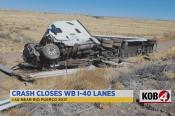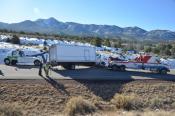Complete New Mexico accident reports and news.
New Mexico - The Land of Enchantment, offering scenic beauty, rich cultural history, and exceptional recreational opportunity
New Mexico was inhabited by indigenous peoples of the Americas for many centuries before European exploration, and later, it was part of Mexico before becoming a U.S. territory and eventually a U.S. state. Among U.S. states, New Mexico has the highest percentage of Hispanics, including descendants of Spanish colonists who have lived in the area for more than 400 years. The Native American nations in the state consist of mostly Navajo, Pueblo, and Apache peoples. As a result, the demographics and culture of the state are unique for their strong Hispanic and Native American influences.
Oil and gas production, agriculture, mining, tourism, and federal government spending are important drivers of New Mexico's economy.
New Mexico's climate can contribute to accidents in the region
According to the New Mexico State University Climate Center, the mean annual temperatures range from 64° F in the extreme southeast to 40° F or lower in high mountains and valleys of the north. Average annual precipitation ranges from less than 10 inches over much of the southern desert and the Rio Grande and San Juan Valleys to more than 20 inches at higher elevations in the state. Heavy summer thunderstorms may bring several inches of rain to small areas in a short time. Because of the rough terrain and sparse vegetation in many areas, runoffs from these storms frequently cause local flash floods.
Major highways in New Mexico
Interstate 40, a major east–west route of the Interstate Highway System, runs east–west through Albuquerque. It is the direct replacement for the historic U.S. Route 66.
Interstate 25 follows the north–south corridor through Albuquerque and Santa Fe.
Interstate 10 traverses Southern New Mexico through Hidalgo, Grant, Luna, and Doña Ana counties. The Interstate travels west–east between the Arizona state line and the interchange with I-25 in Las Cruces, and then travels north–south into Texas.
The New Mexico Department of Transportation maintains a top-quality website with travel, weather, road condition, and other information valuable to travelers across the state. It also has information for bicyclists, pedestrians, and equestrians.
In Accident Data Center, you can find information about recent New Mexico collisions at this link for Albuquerque and Santa Fe accidents.
When someone is injured in an accident in New Mexico, it is important to gather information about what happens next.
Being injured in a serious accident is always a shocking and scary experience, and dealing with the aftermath is exhausting and stressful. Accident victims are forced to deal with hospitalization, medical treatments, missed work, and lost income, often while trying to manage pain and disability from their injuries. And then the insurance adjusters start circling. Find out more about accidents and what issues an injured person needs to be aware of by going to this link.
What to do after a serious injury accident in New Mexico
When someone has been injured or killed in a motor-vehicle collision in New Mexico, the accident victim and their family members are left with medical bills, lost income, and other costs. It is important to get legal assistance to help the accident victim recover, or when the accident is fatal, to help the family members get fully compensated for their losses. Learn more about how a good New Mexico personal injury attorney will help injured victims and families.
Accident reports by area
Legal and Other Resources and Information
New Mexico DOT-Department of Transportation
New Mexico State Police
New Mexico 511 Roads
New Mexico Courts - The Judicial Branch of New Mexico
New Mexico Trial Lawyers Association
University of New Mexico School of Law
New Mexico State Bar Association
Most recent accident reports
Albuquerque-Santa Fe, NM
Albuquerque-Santa Fe, NM
Albuquerque-Santa Fe, NM
Albuquerque-Santa Fe, NM
Albuquerque-Santa Fe, NM
Albuquerque-Santa Fe, NM


